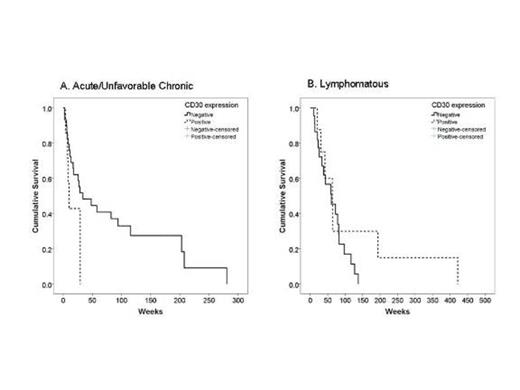Abstract
Adult T-cell leukemia-lymphoma (ATLL) is a rare malignancy caused by the human T-lymphotropic virus type-1 (HTLV-I) which has a dismal prognosis, urging development of new therapeutic strategies. ATLL is commonly encountered in Miami due to its proximity to the Caribbean, where HTLV-I is endemic. CD30, a well-known marker of activated T-cells that participates in regulating memory cells, has been reported to be positively expressed at variable frequencies in ATLL cells, with positive expression rates ranging from 21- 50% of cases. The variation in reported CD30 expression rates is likely due to the heterogeneous nature of this neoplasm and inclusion of different ATLL subtypes within previous study populations. We hypothesized that the CD30 expression in ATLL was likely to differ based on the subtype of ATLL. Additionally, because CD30 is a molecule involved in multiple cell regulation and activation functions, predominantly through the NFKB signaling pathway, we predicted that CD30 could be a potential marker for prognosis and disease behavior in ATLL. We have conducted this study to evaluate the association that CD30 expression may have with ATLL disease subtype and survival in our population. The availability of targeted therapy (anti-CD30-monomethyl-auristatin-E conjugate brentuximab vedotin) makes identification of the role of CD30 expression in ATLL an important one, particularly as clinical trials using these therapies are currently underway.
We conducted a historic cohort study of CD30 expression in cases of ATLL including patients of any age and at initial diagnosis. Cases were retrieved from our clinical and pathology information systems (UM/JMH). CD30 expression was evaluated by either immunohistochemistry (IHC) using antihuman CD30 monoclonal mouse antibody, clone Ber-H2, (Dako, Carpinteria, CA; IR602, Dilution: 1:30) performed on formalin-fixed paraffin-embedded tissue sections or on cytospins prepared from CD4+-enriched peripheral blood leukemic specimens, using 30% expression as a cut-off positive value. We analyzed overall CD30 expression, CD30 expression by sub-type and survival outcome according to CD30 expression. Kaplan-Meier survival curves, log-rank test and Cox proportional hazards regression where used for survival analysis. An alpha value of 0.1 was used for all statistical tests.
Sixty-eight ATLL cases (lymphomatous n= 31, acute n=33, unfavorable chronic n=3, smoldering n=1) met inclusion criteria, and had CD30 status and complete clinical data available. The overall proportion of CD30+ ATLLs was 22.1% (95% CI 13.8% – 30.3%). The frequency of CD30 expression for each group is as follows: lymphomatous: 25.8%, acute: 21.2%, unfavorable chronic: 0%, smoldering: 0%. There was no significant difference for CD30 expression between the combined acute/unfavorable chronic (A/UC) subgroup and the lymphomatous subgroup (proportion difference 6.4%; CI 90% -10.52% – 23.24%). Within the A/UC subgroup the median survival for CD30+ patients was 10.1 weeks compared to 33.7 weeks for CD30- patients (P=0.071). CD30 expression was associated with a higher risk of death in patients within the A/UC subgroup (hazard ratio [HR]: 2.6, 90% CI: 1.1 – 6.2) (Figure 1A). Within the lymphomatous subgroup the median survival for CD30+ patients was 63.1 weeks compared to 60.3 weeks for CD30- patients (P=0.260) and there no association of CD30 status with the risk of death in the lymphomatous subgroup (HR: 0.6, 90% CI: 0.2 – 1.3) (Figure 1B).
Our data show that 22.1% of ATLL is CD30+ and that expression is similar amongst aggressive ATLL subtypes. CD30 could be a marker of prognosis in cases of acute or unfavorable chronic ATLL. CD30+ cases of any subtype are potentially amenable to anti-CD30 therapy. Targeted anti-CD30 therapy may be especially useful in CD30+ acute type ATLL, which carry the worst prognosis. Given the sample size, these results must be validated in a larger cohort.
No relevant conflicts of interest to declare.
Author notes
Asterisk with author names denotes non-ASH members.


This feature is available to Subscribers Only
Sign In or Create an Account Close Modal